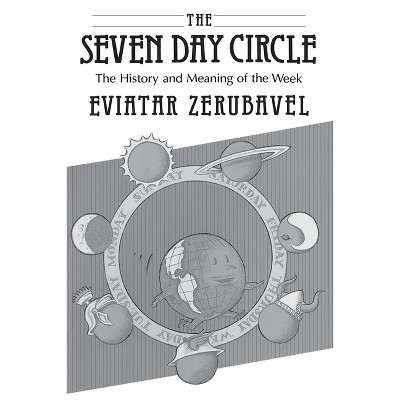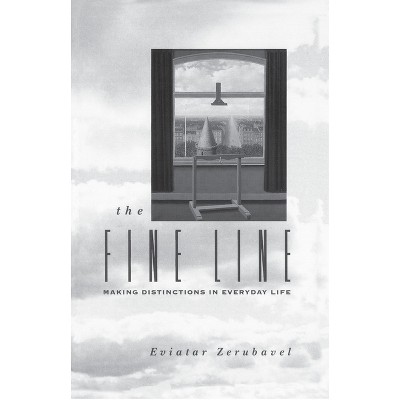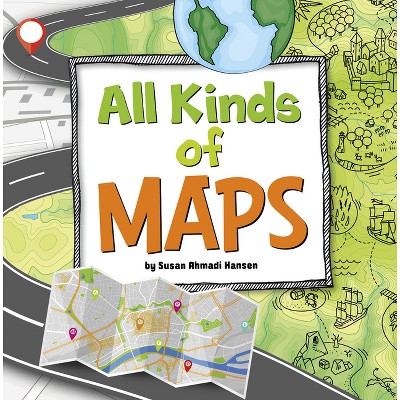Sponsored

Time Maps - 2nd Edition by Eviatar Zerubavel (Paperback)
$30.00
In Stock
Eligible for registries and wish lists
Sponsored
About this item
Highlights
- "Time Maps extends beyond all of the old clichés about linear, circular, and spiral patterns of historical process and provides us with models of the actual legends used to map history.
- About the Author: Eviatar Zerubavel is a professor of sociology at Rutgers University.
- 187 Pages
- History, Essays
Description
Book Synopsis
"Time Maps extends beyond all of the old clichés about linear, circular, and spiral patterns of historical process and provides us with models of the actual legends used to map history. It is a brilliant and elegant exercise in model building that provides new insights into some of the old questions about philosophy of history, historical narrative, and what is called straight history."-Hayden White, University of California, Santa Cruz Who were the first people to inhabit North America? Does the West Bank belong to the Arabs or the Jews? Why are racists so obsessed with origins? Is a seventh cousin still a cousin? Why do some societies name their children after dead ancestors? As Eviatar Zerubavel demonstrates in Time Maps, we cannot answer burning questions such as these without a deeper understanding of how we envision the past. In a pioneering attempt to map the structure of our collective memory, Zerubavel considers the cognitive patterns we use to organize the past in our minds and the mental strategies that help us string together unrelated events into coherent and meaningful narratives, as well as the social grammar of battles over conflicting interpretations of history. Drawing on fascinating examples that range from Hiroshima to the Holocaust, from Columbus to Lucy, and from ancient Egypt to the former Yugoslavia, Zerubavel shows how we construct historical origins; how we tie discontinuous events together into stories; how we link families and entire nations through genealogies; and how we separate distinct historical periods from one another through watersheds, such as the invention of fire or the fall of the Berlin Wall. Most people think the Roman Empire ended in 476, even though it lasted another 977 years in Byzantium. Challenging such conventional wisdom, Time Maps will be must reading for anyone interested in how the history of our world takes shape.From the Back Cover
Who were the first people to inhabit North America? Does the West Bank belong to the Arabs or the Jews? Why are racists so obsessed with origins? Is a seventh cousin still a cousin? Why do some societies name their children after dead ancestors? As Eviatar Zerubavel demonstrates in Time Maps, we cannot answer burning questions such as these without a deeper understanding of how we envision the past. In a pioneering attempt to map the structure of our collective memory, Zerubavel considers the cognitive patterns we use to organize the past in our minds and the mental strategies that help us string together unrelated events into coherent and meaningful narratives, as well as the social grammar of battles over conflicting interpretations of history. Drawing on fascinating examples that range from Hiroshima to the Holocaust, from Columbus to Lucy, and from ancient Egypt to the former Yugoslavia, Zerubavel shows how we construct historical origins; how we tie discontinuous events together into stories; how we link families and entire nations through genealogies; and how we separate distinct historical periods from one another through watersheds, such as the invention of fire or the fall of the Berlin Wall. Most people think the Roman Empire ended in 476, even though it lasted another 977 years in Byzantium. Challenging such conventional wisdom, Time Maps will be must reading for anyone interested in how the history of our world takes shape.About the Author
Eviatar Zerubavel is a professor of sociology at Rutgers University. He is the author of seven other books, including Social Mindscapes: An Invitation to Cognitive Sociology, The Seven-Day Circle: The History and Meaning of the Week, and The Fine Line: Making Distinctions in Everyday Life.Dimensions (Overall): 9.04 Inches (H) x 6.04 Inches (W) x .56 Inches (D)
Weight: .66 Pounds
Suggested Age: 22 Years and Up
Number of Pages: 187
Genre: History
Sub-Genre: Essays
Publisher: University of Chicago Press
Format: Paperback
Author: Eviatar Zerubavel
Language: English
Street Date: November 1, 2004
TCIN: 1006090829
UPC: 9780226981536
Item Number (DPCI): 247-19-3578
Origin: Made in the USA or Imported
If the item details aren’t accurate or complete, we want to know about it.
Shipping details
Estimated ship dimensions: 0.56 inches length x 6.04 inches width x 9.04 inches height
Estimated ship weight: 0.66 pounds
We regret that this item cannot be shipped to PO Boxes.
This item cannot be shipped to the following locations: American Samoa (see also separate entry under AS), Guam (see also separate entry under GU), Northern Mariana Islands, Puerto Rico (see also separate entry under PR), United States Minor Outlying Islands, Virgin Islands, U.S., APO/FPO
Return details
This item can be returned to any Target store or Target.com.
This item must be returned within 90 days of the date it was purchased in store, shipped, delivered by a Shipt shopper, or made ready for pickup.
See the return policy for complete information.
Trending Non-Fiction


$18.28
was $19.58 New lower price
4.7 out of 5 stars with 17 ratings
















